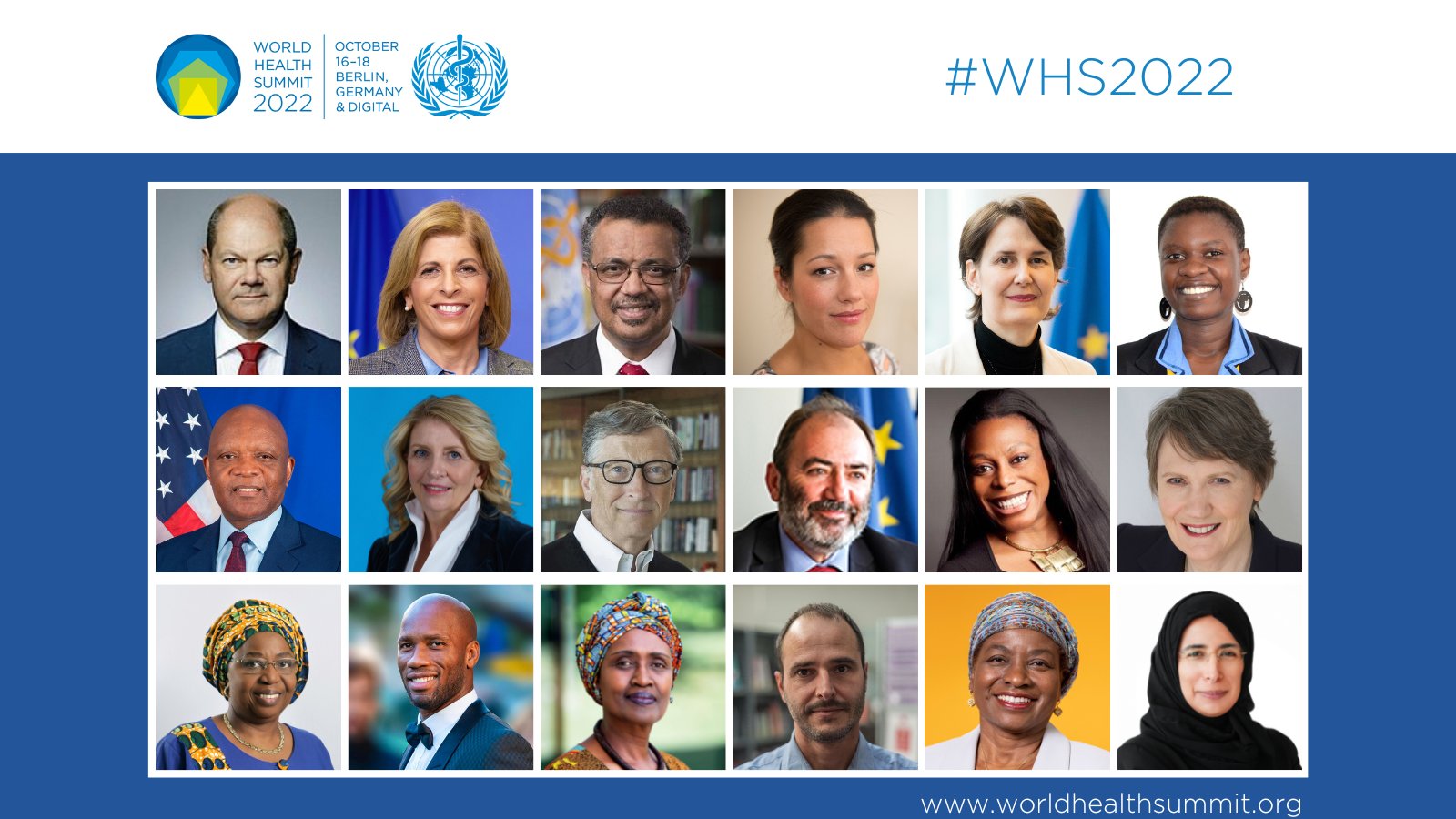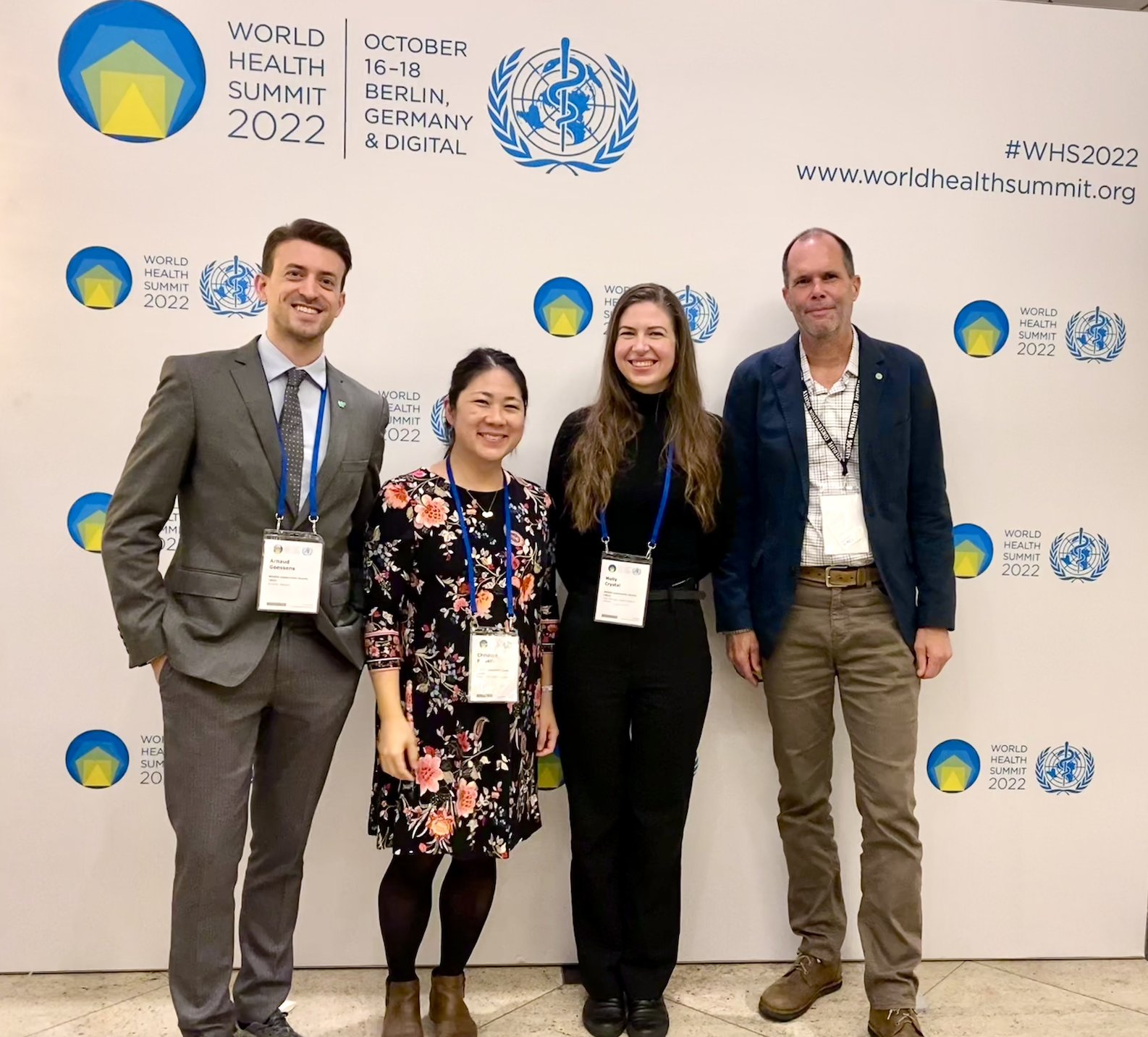
World Health Summit
The World Health Summit (WHS) took place on 16-18 October 2022 in Berlin, Germany, with 404 speakers from 141 countries and 4,100 participants on-site, and more than 60,000 digital participants. As the planet continues to face the multiple impacts of COVID-19 on human health, well-being and economies, it’s time for governments across the globe to take the necessary steps to help prevent future pandemics of zoonotic origin.
One of the resounding messages from the WHS 2022 is that human health cannot be considered alone and that it is intrinsically linked to animal and ecosystem health. This theme was tackled further during several WHS sessions focused on One Health and diseases of zoonotic origin. Recent studies show that the single most effective and cost-effective way to prevent pandemics is to avoid pathogen spillover to humans, wildlife, and other animals in the first place, referred to as pandemic prevention at source. The science is clear that pandemics of zoonotic origin, such as COVID-19, are directly related to the increased human/wildlife interface caused by land-use change, in particular the destruction of intact ecosystems; deforestation and forest degradation; and the role of urban markets in live wild birds and mammals and wildlife farm.

In October 2019, a mere two months before the COVID-19 pandemic ravaged the global economy and severely impacted our societies, the Wildlife Conservation Society (WCS) and the German Federal Foreign Office co-hosted a conference titled, “One Planet, One Health, One Future” which brought together members of academia, government, policy, and civil society from nearly 50 countries to forge the Berlin Principles on One Health, capturing the threat to society if we continue to ignore the interconnected issues relevant to human, animal and environmental health. The European Union (EU), France, and Germany are stepping up efforts in the One Health area, notably through the Sustainable Wildlife Management (SWM) Programme, the Preventing ZOonotic Disease Emergence (PREZODE) initiative, and the International Alliance against Health Risks in Wildlife Trade, all of which WCS is an active member and partner.
WCS health and policy experts attended the WHS to contribute to discussions on the importance of the One Health approach and the critical need to include ‘prevention at source’ in the new World Health Organization (WHO) instrument to strengthen pandemic prevention, preparedness and response, and to connect with longstanding EU, French, German, and other partners and colleagues. In the picture below (left to right): Arnaud Goessens, Associate Director, EU Policy; Christine Franklin, International Policy Officer; Molly Crystal, Director of Strategic Partnerships, Germany; and Chris Walzer, Executive Director, Health Program.

More than an Economic Case for Pandemic Prevention at the Source
In the wake of immediate reactions to COVID-19 – most of which were taken under immense pressure to respond to and manage an ongoing crisis – many key actors, are now contemplating how to avoid and handle possible future pandemics more intelligently, efficiently and effectively. Considering this challenge, panelists were asked: How can lessons learned from COVID-19 and primary prevention take a more prominent role in global responses to reduce the risk of future pandemics? What would such a policy path look like? This session was chaired by Dr. Eckart von Hirschhausen, Physician, Science Journalist, Founder of Healthy Planet - Healthy People Foundation and World Health Summit Ambassador, and included speakers such as Mr. Jochen Flasbarth, State Secretary, German Federal Ministry for Economic Cooperation and Development (BMZ), and Dr. María Neira, Director, Department of Environment, Climate Change and Health, WHO. See full programme here.
Lessons Learned from COVID-19: Preventing Zoonotic Diseases Emergence
Over the past 50 years, there has been a significant increase in the emergence of infectious diseases. More than 70% of emerging infectious diseases are zoonoses, diseases caused by germs that spread between wild animals, farm animals and humans. Almost all the pandemics we know of are zoonoses (SARS Cov2, Ebola and COVID-19 to name a few). These emergences and re-emergences are deeply linked to the pressures exerted on the environment, in particular on natural habitats and biodiversity. Panelists discussed why it is necessary to set up a “One Health” approach integrating human health, animal health and environmental health and how to prevent the emergence of new infectious diseases. This session was chaired by Dr. Benjamin Roche, Research Director, Institute of Research for Development (IRD), and included speakers such as Prof. Dr. Wanda Markotter, Co-Chair, One Health High Level Expert Panel (OHHLEP) and Prof. Dr. Andrea Winkler, Co-Chair, The Lancet One Health Commission. See full programme here.
Sustainable Health for People and Planet
Globally, climate change and ecosystem degradation, as well as epidemics and natural disasters, which are increasing in frequency, duration and intensity, are posing immense threats to human health and well-being. The calls from the global heath community for urgent action on the climate crisis have gained new urgency in relation to their impact on health. Panelists discussed prevention at systems transformation level, the examination of successful mitigation and adaptation processes, and governing innovation for the public good and governing public goods. This session was chaired by Prof. Dr. Stefan Swartling Peterson, Professor of Global Transformations for Health, Karolinska Institute, and included speakers such as Ms. Steffi Lemke, Federal Minister, German Federal Ministry for the Environment, Nature Conservation, Nuclear Safety and Consumer Protection (BMUV) and Ms. Rose Kobusinge, Environmental Change Graduate, University of Oxford. See full programme here.
One Health in Action
The COVID-19 pandemic, the emergence of other zoonosis, along with the increasing antimicrobial resistance make clear that we need to approach the topic of health with a broader understanding regarding the close links between the health of humans, animals, agriculture and the environment using the so called One Health approach. Since the diversity of species and habitats on Earth is vital to all life, including human life it is essential to protect the natural environment in all its diversity, lessening the risk of future pandemics and vector-borne diseases. Panelists discussed how can the One Health approach be put into practice in concrete terms and how can One Health projects be operationalized. The session was chaired by Dr. Peter Karim Ben Embarek, Director for One Health, WHO, and included speakers such as Mr. Jochen Flasbarth, State Secretary, German Federal Ministry for Economic Cooperation and Development (BMZ) and Ms. Ines Perea, Subdivision Manager for Health Security, German Federal Ministry of Health (BMG). See full programme here.
READ MORE
Pandemic prevention at source
Links between Ecological Integrity and Human Health
Best Practices to Confront Pandemics at the Source
WCS Recommendations to Reduce Pandemic Risk